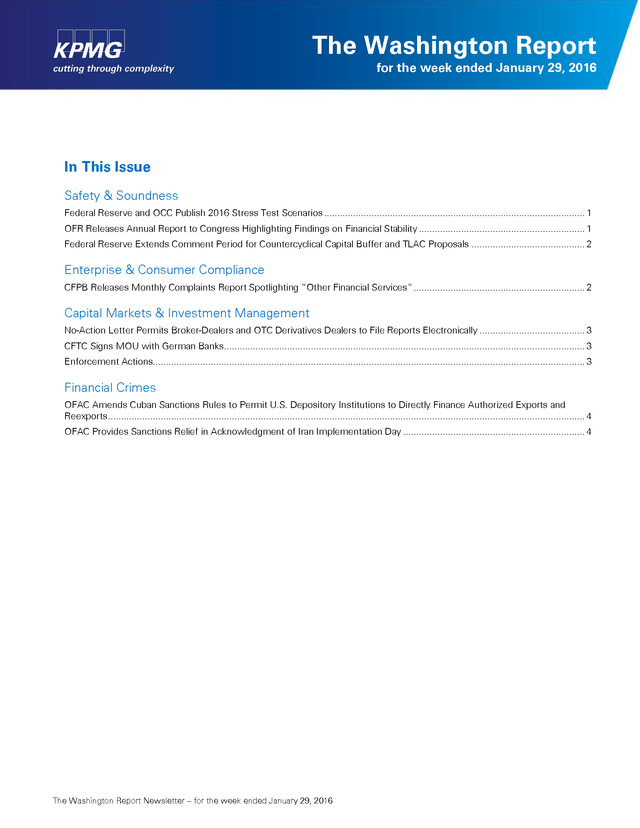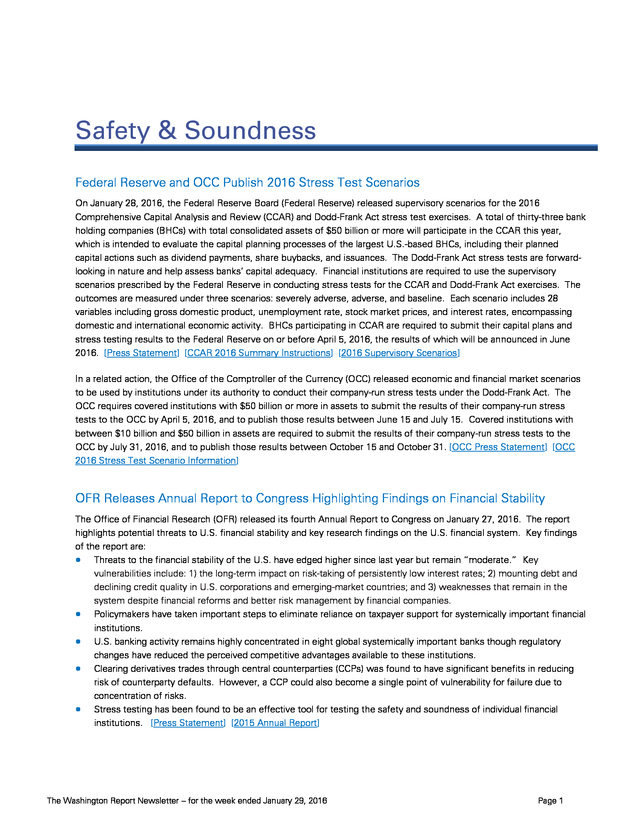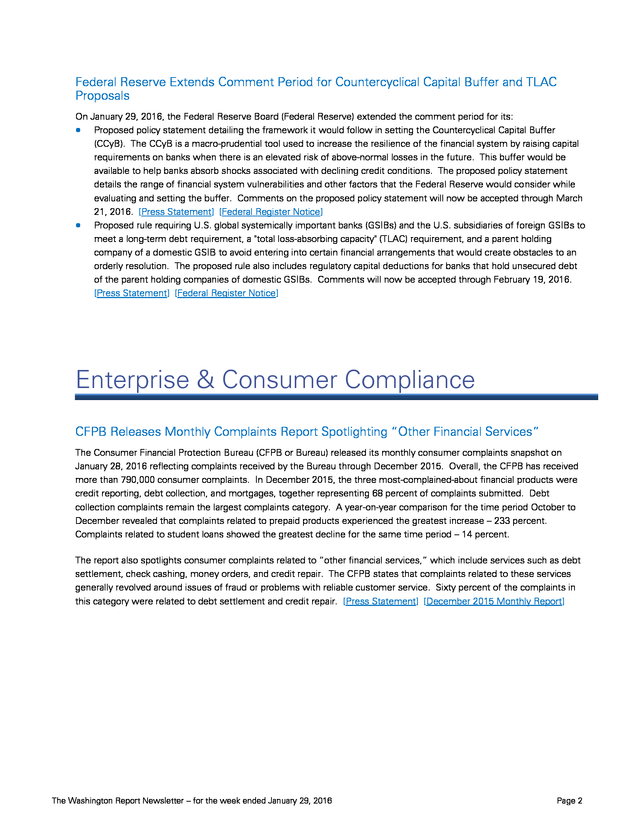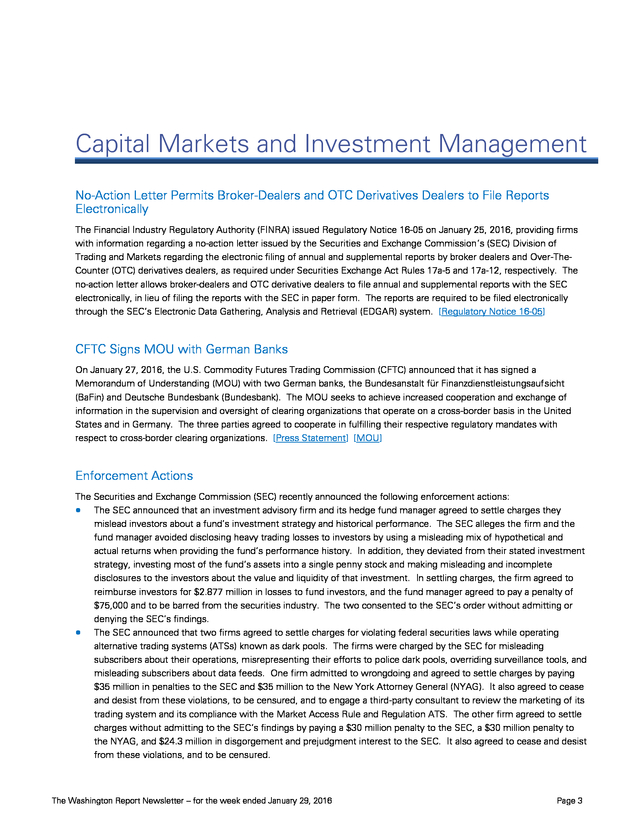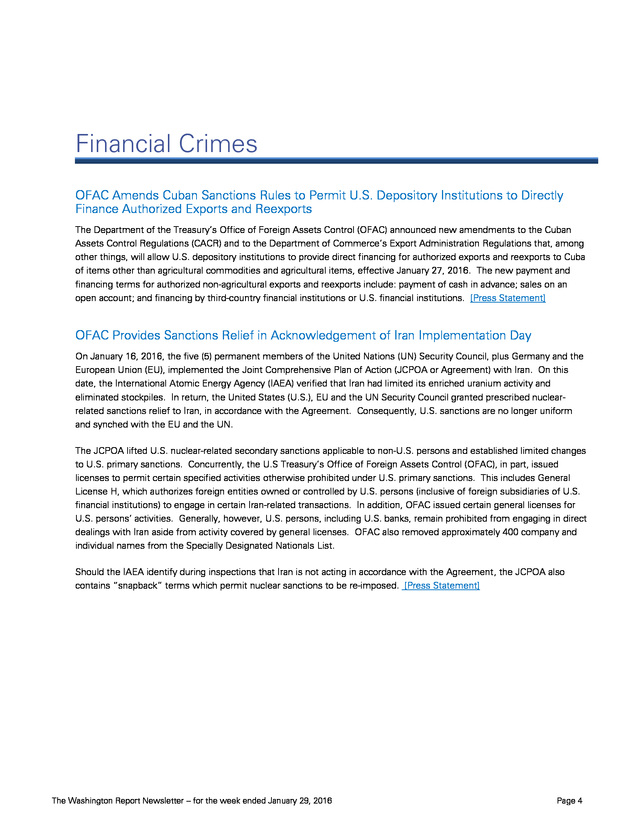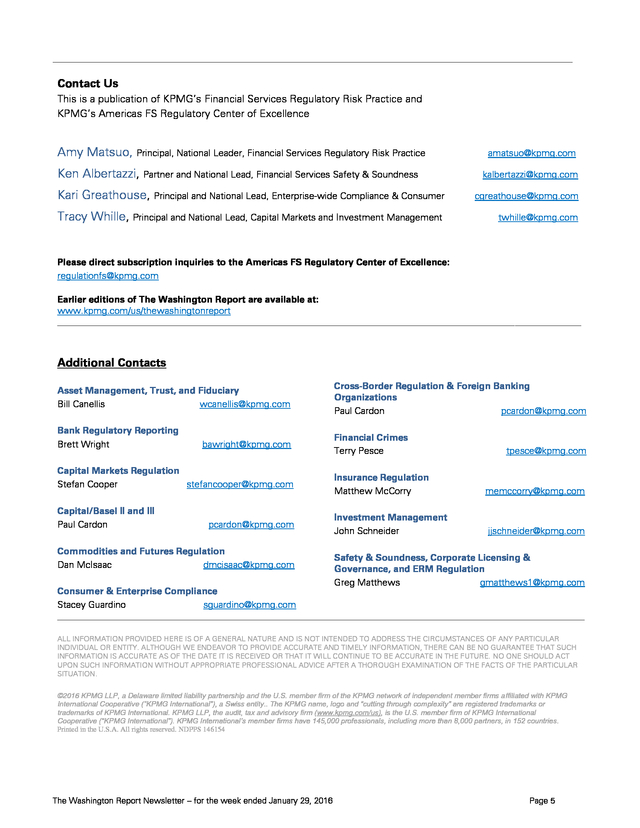Description
The Washington Report
for the week ended January 29, 2016
In This Issue
Safety & Soundness
Federal Reserve and OCC Publish 2016 Stress Test Scenarios ................................................................................................... 1
OFR Releases Annual Report to Congress Highlighting Findings on Financial Stability ............................................................... 1
Federal Reserve Extends Comment Period for Countercyclical Capital Buffer and TLAC Proposals ........................................... 2
Enterprise & Consumer Compliance
CFPB Releases Monthly Complaints Report Spotlighting “Other Financial Services” .................................................................
2 Capital Markets & Investment Management No-Action Letter Permits Broker-Dealers and OTC Derivatives Dealers to File Reports Electronically ........................................ 3 CFTC Signs MOU with German Banks......................................................................................................................................... 3 Enforcement Actions....................................................................................................................................................................
3 Financial Crimes OFAC Amends Cuban Sanctions Rules to Permit U.S. Depository Institutions to Directly Finance Authorized Exports and Reexports ..................................................................................................................................................................................... 4 OFAC Provides Sanctions Relief in Acknowledgment of Iran Implementation Day .....................................................................
4 The Washington Report Newsletter – for the week ended January 29, 2016 . The Washington Report Safety & Soundness Federal Reserve and OCC Publish 2016 Stress Test Scenarios On January 28, 2016, the Federal Reserve Board (Federal Reserve) released supervisory scenarios for the 2016 Comprehensive Capital Analysis and Review (CCAR) and Dodd-Frank Act stress test exercises. A total of thirty-three bank holding companies (BHCs) with total consolidated assets of $50 billion or more will participate in the CCAR this year, which is intended to evaluate the capital planning processes of the largest U.S.-based BHCs, including their planned capital actions such as dividend payments, share buybacks, and issuances. The Dodd-Frank Act stress tests are forwardlooking in nature and help assess banks’ capital adequacy. Financial institutions are required to use the supervisory scenarios prescribed by the Federal Reserve in conducting stress tests for the CCAR and Dodd-Frank Act exercises.
The outcomes are measured under three scenarios: severely adverse, adverse, and baseline. Each scenario includes 28 variables including gross domestic product, unemployment rate, stock market prices, and interest rates, encompassing domestic and international economic activity. BHCs participating in CCAR are required to submit their capital plans and stress testing results to the Federal Reserve on or before April 5, 2016, the results of which will be announced in June 2016.
[Press Statement] [CCAR 2016 Summary Instructions] [2016 Supervisory Scenarios] In a related action, the Office of the Comptroller of the Currency (OCC) released economic and financial market scenarios to be used by institutions under its authority to conduct their company-run stress tests under the Dodd-Frank Act. The OCC requires covered institutions with $50 billion or more in assets to submit the results of their company-run stress tests to the OCC by April 5, 2016, and to publish those results between June 15 and July 15. Covered institutions with between $10 billion and $50 billion in assets are required to submit the results of their company-run stress tests to the OCC by July 31, 2016, and to publish those results between October 15 and October 31.
[OCC Press Statement] [OCC 2016 Stress Test Scenario Information] OFR Releases Annual Report to Congress Highlighting Findings on Financial Stability The Office of Financial Research (OFR) released its fourth Annual Report to Congress on January 27, 2016. The report highlights potential threats to U.S. financial stability and key research findings on the U.S.
financial system. Key findings of the report are: ï‚· Threats to the financial stability of the U.S. have edged higher since last year but remain “moderate.” Key vulnerabilities include: 1) the long-term impact on risk-taking of persistently low interest rates; 2) mounting debt and declining credit quality in U.S.
corporations and emerging-market countries; and 3) weaknesses that remain in the system despite financial reforms and better risk management by financial companies. ï‚· Policymakers have taken important steps to eliminate reliance on taxpayer support for systemically important financial institutions. ï‚· U.S. banking activity remains highly concentrated in eight global systemically important banks though regulatory changes have reduced the perceived competitive advantages available to these institutions. ï‚· Clearing derivatives trades through central counterparties (CCPs) was found to have significant benefits in reducing risk of counterparty defaults. However, a CCP could also become a single point of vulnerability for failure due to concentration of risks. ï‚· Stress testing has been found to be an effective tool for testing the safety and soundness of individual financial institutions.
[Press Statement] [2015 Annual Report] The Washington Report Newsletter – for the week ended January 29, 2016 Page 1 . Federal Reserve Extends Comment Period for Countercyclical Capital Buffer and TLAC Proposals On January 29, 2016, the Federal Reserve Board (Federal Reserve) extended the comment period for its: ï‚· Proposed policy statement detailing the framework it would follow in setting the Countercyclical Capital Buffer (CCyB). The CCyB is a macro-prudential tool used to increase the resilience of the financial system by raising capital requirements on banks when there is an elevated risk of above-normal losses in the future. This buffer would be available to help banks absorb shocks associated with declining credit conditions. The proposed policy statement details the range of financial system vulnerabilities and other factors that the Federal Reserve would consider while evaluating and setting the buffer.
Comments on the proposed policy statement will now be accepted through March 21, 2016. [Press Statement] [Federal Register Notice] ï‚· Proposed rule requiring U.S. global systemically important banks (GSIBs) and the U.S.
subsidiaries of foreign GSIBs to meet a long-term debt requirement, a "total loss-absorbing capacity" (TLAC) requirement, and a parent holding company of a domestic GSIB to avoid entering into certain financial arrangements that would create obstacles to an orderly resolution. The proposed rule also includes regulatory capital deductions for banks that hold unsecured debt of the parent holding companies of domestic GSIBs. Comments will now be accepted through February 19, 2016. [Press Statement] [Federal Register Notice] Enterprise & Consumer Compliance CFPB Releases Monthly Complaints Report Spotlighting “Other Financial Services” The Consumer Financial Protection Bureau (CFPB or Bureau) released its monthly consumer complaints snapshot on January 28, 2016 reflecting complaints received by the Bureau through December 2015.
Overall, the CFPB has received more than 790,000 consumer complaints. In December 2015, the three most-complained-about financial products were credit reporting, debt collection, and mortgages, together representing 68 percent of complaints submitted. Debt collection complaints remain the largest complaints category.
A year-on-year comparison for the time period October to December revealed that complaints related to prepaid products experienced the greatest increase – 233 percent. Complaints related to student loans showed the greatest decline for the same time period – 14 percent. The report also spotlights consumer complaints related to “other financial services,” which include services such as debt settlement, check cashing, money orders, and credit repair. The CFPB states that complaints related to these services generally revolved around issues of fraud or problems with reliable customer service. Sixty percent of the complaints in this category were related to debt settlement and credit repair.
[Press Statement] [December 2015 Monthly Report] The Washington Report Newsletter – for the week ended January 29, 2016 Page 2 . Capital Markets and Investment Management No-Action Letter Permits Broker-Dealers and OTC Derivatives Dealers to File Reports Electronically The Financial Industry Regulatory Authority (FINRA) issued Regulatory Notice 16-05 on January 25, 2016, providing firms with information regarding a no-action letter issued by the Securities and Exchange Commission’s (SEC) Division of Trading and Markets regarding the electronic filing of annual and supplemental reports by broker dealers and Over-TheCounter (OTC) derivatives dealers, as required under Securities Exchange Act Rules 17a-5 and 17a-12, respectively. The no-action letter allows broker-dealers and OTC derivative dealers to file annual and supplemental reports with the SEC electronically, in lieu of filing the reports with the SEC in paper form. The reports are required to be filed electronically through the SEC’s Electronic Data Gathering, Analysis and Retrieval (EDGAR) system. [Regulatory Notice 16-05] CFTC Signs MOU with German Banks On January 27, 2016, the U.S.
Commodity Futures Trading Commission (CFTC) announced that it has signed a Memorandum of Understanding (MOU) with two German banks, the Bundesanstalt für Finanzdienstleistungsaufsicht (BaFin) and Deutsche Bundesbank (Bundesbank). The MOU seeks to achieve increased cooperation and exchange of information in the supervision and oversight of clearing organizations that operate on a cross-border basis in the United States and in Germany. The three parties agreed to cooperate in fulfilling their respective regulatory mandates with respect to cross-border clearing organizations.
[Press Statement] [MOU] Enforcement Actions The Securities and Exchange Commission (SEC) recently announced the following enforcement actions: ï‚· The SEC announced that an investment advisory firm and its hedge fund manager agreed to settle charges they mislead investors about a fund’s investment strategy and historical performance. The SEC alleges the firm and the fund manager avoided disclosing heavy trading losses to investors by using a misleading mix of hypothetical and actual returns when providing the fund’s performance history. In addition, they deviated from their stated investment strategy, investing most of the fund’s assets into a single penny stock and making misleading and incomplete disclosures to the investors about the value and liquidity of that investment.
In settling charges, the firm agreed to reimburse investors for $2.877 million in losses to fund investors, and the fund manager agreed to pay a penalty of $75,000 and to be barred from the securities industry. The two consented to the SEC’s order without admitting or denying the SEC’s findings. ï‚· The SEC announced that two firms agreed to settle charges for violating federal securities laws while operating alternative trading systems (ATSs) known as dark pools. The firms were charged by the SEC for misleading subscribers about their operations, misrepresenting their efforts to police dark pools, overriding surveillance tools, and misleading subscribers about data feeds.
One firm admitted to wrongdoing and agreed to settle charges by paying $35 million in penalties to the SEC and $35 million to the New York Attorney General (NYAG). It also agreed to cease and desist from these violations, to be censured, and to engage a third-party consultant to review the marketing of its trading system and its compliance with the Market Access Rule and Regulation ATS. The other firm agreed to settle charges without admitting to the SEC’s findings by paying a $30 million penalty to the SEC, a $30 million penalty to the NYAG, and $24.3 million in disgorgement and prejudgment interest to the SEC.
It also agreed to cease and desist from these violations, and to be censured. The Washington Report Newsletter – for the week ended January 29, 2016 Page 3 . Financial Crimes OFAC Amends Cuban Sanctions Rules to Permit U.S. Depository Institutions to Directly Finance Authorized Exports and Reexports The Department of the Treasury’s Office of Foreign Assets Control (OFAC) announced new amendments to the Cuban Assets Control Regulations (CACR) and to the Department of Commerce’s Export Administration Regulations that, among other things, will allow U.S. depository institutions to provide direct financing for authorized exports and reexports to Cuba of items other than agricultural commodities and agricultural items, effective January 27, 2016. The new payment and financing terms for authorized non-agricultural exports and reexports include: payment of cash in advance; sales on an open account; and financing by third-country financial institutions or U.S.
financial institutions. [Press Statement] OFAC Provides Sanctions Relief in Acknowledgement of Iran Implementation Day On January 16, 2016, the five (5) permanent members of the United Nations (UN) Security Council, plus Germany and the European Union (EU), implemented the Joint Comprehensive Plan of Action (JCPOA or Agreement) with Iran. On this date, the International Atomic Energy Agency (IAEA) verified that Iran had limited its enriched uranium activity and eliminated stockpiles.
In return, the United States (U.S.), EU and the UN Security Council granted prescribed nuclearrelated sanctions relief to Iran, in accordance with the Agreement. Consequently, U.S. sanctions are no longer uniform and synched with the EU and the UN. The JCPOA lifted U.S.
nuclear-related secondary sanctions applicable to non-U.S. persons and established limited changes to U.S. primary sanctions.
Concurrently, the U.S Treasury’s Office of Foreign Assets Control (OFAC), in part, issued licenses to permit certain specified activities otherwise prohibited under U.S. primary sanctions. This includes General License H, which authorizes foreign entities owned or controlled by U.S.
persons (inclusive of foreign subsidiaries of U.S. financial institutions) to engage in certain Iran-related transactions. In addition, OFAC issued certain general licenses for U.S. persons’ activities.
Generally, however, U.S. persons, including U.S. banks, remain prohibited from engaging in direct dealings with Iran aside from activity covered by general licenses.
OFAC also removed approximately 400 company and individual names from the Specially Designated Nationals List. Should the IAEA identify during inspections that Iran is not acting in accordance with the Agreement, the JCPOA also contains “snapback” terms which permit nuclear sanctions to be re-imposed. [Press Statement] The Washington Report Newsletter – for the week ended January 29, 2016 Page 4 . ______________________________________________________________________________________________________________________________________________ Contact Us This is a publication of KPMG’s Financial Services Regulatory Risk Practice and KPMG’s Americas FS Regulatory Center of Excellence Amy Matsuo, Principal, National Leader, Financial Services Regulatory Risk Practice Ken Albertazzi, Partner and National Lead, Financial Services Safety & Soundness amatsuo@kpmg.com kalbertazzi@kpmg.com Kari Greathouse, Principal and National Lead, Enterprise-wide Compliance & Consumer cgreathouse@kpmg.com Tracy Whille, Principal and National Lead, Capital Markets and Investment Management twhille@kpmg.com Please direct subscription inquiries to the Americas FS Regulatory Center of Excellence: regulationfs@kpmg.com Earlier editions of The Washington Report are available at: www.kpmg.com/us/thewashingtonreport _______________________________________________________________________________________________________________________________________________ Additional Contacts Asset Management, Trust, and Fiduciary Bill Canellis wcanellis@kpmg.com Bank Regulatory Reporting Brett Wright bawright@kpmg.com Capital Markets Regulation Stefan Cooper stefancooper@kpmg.com Capital/Basel II and III Paul Cardon pcardon@kpmg.com Commodities and Futures Regulation Dan McIsaac dmcisaac@kpmg.com Consumer & Enterprise Compliance Stacey Guardino sguardino@kpmg.com Cross-Border Regulation & Foreign Banking Organizations Paul Cardon pcardon@kpmg.com Financial Crimes Terry Pesce tpesce@kpmg.com Insurance Regulation Matthew McCorry memccorry@kpmg.com Investment Management John Schneider jjschneider@kpmg.com Safety & Soundness, Corporate Licensing & Governance, and ERM Regulation Greg Matthews gmatthews1@kpmg.com ________________________________________________________________________________________________________________________________________________ ALL INFORMATION PROVIDED HERE IS OF A GENERAL NATURE AND IS NOT INTENDED TO ADDRESS THE CIRCUMSTANCES OF ANY PARTICULAR INDIVIDUAL OR ENTITY. ALTHOUGH WE ENDEAVOR TO PROVIDE ACCURATE AND TIMELY INFORMATION, THERE CAN BE NO GUARANTEE THAT SUCH INFORMATION IS ACCURATE AS OF THE DATE IT IS RECEIVED OR THAT IT WILL CONTINUE TO BE ACCURATE IN THE FUTURE. NO ONE SHOULD ACT UPON SUCH INFORMATION WITHOUT APPROPRIATE PROFESSIONAL ADVICE AFTER A THOROUGH EXAMINATION OF THE FACTS OF THE PARTICULAR SITUATION. ©2016 KPMG LLP, a Delaware limited liability partnership and the U.S. member firm of the KPMG network of independent member firms affiliated with KPMG International Cooperative ("KPMG International"), a Swiss entity..
The KPMG name, logo and “cutting through complexity” are registered trademarks or trademarks of KPMG International. KPMG LLP, the audit, tax and advisory firm (www.kpmg.com/us), is the U.S. member firm of KPMG International Cooperative ("KPMG International").
KPMG International’s member firms have 145,000 professionals, including more than 8,000 partners, in 152 countries. Printed in the U.S.A. All rights reserved. NDPPS 146154 The Washington Report Newsletter – for the week ended January 29, 2016 Page 5 .
2 Capital Markets & Investment Management No-Action Letter Permits Broker-Dealers and OTC Derivatives Dealers to File Reports Electronically ........................................ 3 CFTC Signs MOU with German Banks......................................................................................................................................... 3 Enforcement Actions....................................................................................................................................................................
3 Financial Crimes OFAC Amends Cuban Sanctions Rules to Permit U.S. Depository Institutions to Directly Finance Authorized Exports and Reexports ..................................................................................................................................................................................... 4 OFAC Provides Sanctions Relief in Acknowledgment of Iran Implementation Day .....................................................................
4 The Washington Report Newsletter – for the week ended January 29, 2016 . The Washington Report Safety & Soundness Federal Reserve and OCC Publish 2016 Stress Test Scenarios On January 28, 2016, the Federal Reserve Board (Federal Reserve) released supervisory scenarios for the 2016 Comprehensive Capital Analysis and Review (CCAR) and Dodd-Frank Act stress test exercises. A total of thirty-three bank holding companies (BHCs) with total consolidated assets of $50 billion or more will participate in the CCAR this year, which is intended to evaluate the capital planning processes of the largest U.S.-based BHCs, including their planned capital actions such as dividend payments, share buybacks, and issuances. The Dodd-Frank Act stress tests are forwardlooking in nature and help assess banks’ capital adequacy. Financial institutions are required to use the supervisory scenarios prescribed by the Federal Reserve in conducting stress tests for the CCAR and Dodd-Frank Act exercises.
The outcomes are measured under three scenarios: severely adverse, adverse, and baseline. Each scenario includes 28 variables including gross domestic product, unemployment rate, stock market prices, and interest rates, encompassing domestic and international economic activity. BHCs participating in CCAR are required to submit their capital plans and stress testing results to the Federal Reserve on or before April 5, 2016, the results of which will be announced in June 2016.
[Press Statement] [CCAR 2016 Summary Instructions] [2016 Supervisory Scenarios] In a related action, the Office of the Comptroller of the Currency (OCC) released economic and financial market scenarios to be used by institutions under its authority to conduct their company-run stress tests under the Dodd-Frank Act. The OCC requires covered institutions with $50 billion or more in assets to submit the results of their company-run stress tests to the OCC by April 5, 2016, and to publish those results between June 15 and July 15. Covered institutions with between $10 billion and $50 billion in assets are required to submit the results of their company-run stress tests to the OCC by July 31, 2016, and to publish those results between October 15 and October 31.
[OCC Press Statement] [OCC 2016 Stress Test Scenario Information] OFR Releases Annual Report to Congress Highlighting Findings on Financial Stability The Office of Financial Research (OFR) released its fourth Annual Report to Congress on January 27, 2016. The report highlights potential threats to U.S. financial stability and key research findings on the U.S.
financial system. Key findings of the report are: ï‚· Threats to the financial stability of the U.S. have edged higher since last year but remain “moderate.” Key vulnerabilities include: 1) the long-term impact on risk-taking of persistently low interest rates; 2) mounting debt and declining credit quality in U.S.
corporations and emerging-market countries; and 3) weaknesses that remain in the system despite financial reforms and better risk management by financial companies. ï‚· Policymakers have taken important steps to eliminate reliance on taxpayer support for systemically important financial institutions. ï‚· U.S. banking activity remains highly concentrated in eight global systemically important banks though regulatory changes have reduced the perceived competitive advantages available to these institutions. ï‚· Clearing derivatives trades through central counterparties (CCPs) was found to have significant benefits in reducing risk of counterparty defaults. However, a CCP could also become a single point of vulnerability for failure due to concentration of risks. ï‚· Stress testing has been found to be an effective tool for testing the safety and soundness of individual financial institutions.
[Press Statement] [2015 Annual Report] The Washington Report Newsletter – for the week ended January 29, 2016 Page 1 . Federal Reserve Extends Comment Period for Countercyclical Capital Buffer and TLAC Proposals On January 29, 2016, the Federal Reserve Board (Federal Reserve) extended the comment period for its: ï‚· Proposed policy statement detailing the framework it would follow in setting the Countercyclical Capital Buffer (CCyB). The CCyB is a macro-prudential tool used to increase the resilience of the financial system by raising capital requirements on banks when there is an elevated risk of above-normal losses in the future. This buffer would be available to help banks absorb shocks associated with declining credit conditions. The proposed policy statement details the range of financial system vulnerabilities and other factors that the Federal Reserve would consider while evaluating and setting the buffer.
Comments on the proposed policy statement will now be accepted through March 21, 2016. [Press Statement] [Federal Register Notice] ï‚· Proposed rule requiring U.S. global systemically important banks (GSIBs) and the U.S.
subsidiaries of foreign GSIBs to meet a long-term debt requirement, a "total loss-absorbing capacity" (TLAC) requirement, and a parent holding company of a domestic GSIB to avoid entering into certain financial arrangements that would create obstacles to an orderly resolution. The proposed rule also includes regulatory capital deductions for banks that hold unsecured debt of the parent holding companies of domestic GSIBs. Comments will now be accepted through February 19, 2016. [Press Statement] [Federal Register Notice] Enterprise & Consumer Compliance CFPB Releases Monthly Complaints Report Spotlighting “Other Financial Services” The Consumer Financial Protection Bureau (CFPB or Bureau) released its monthly consumer complaints snapshot on January 28, 2016 reflecting complaints received by the Bureau through December 2015.
Overall, the CFPB has received more than 790,000 consumer complaints. In December 2015, the three most-complained-about financial products were credit reporting, debt collection, and mortgages, together representing 68 percent of complaints submitted. Debt collection complaints remain the largest complaints category.
A year-on-year comparison for the time period October to December revealed that complaints related to prepaid products experienced the greatest increase – 233 percent. Complaints related to student loans showed the greatest decline for the same time period – 14 percent. The report also spotlights consumer complaints related to “other financial services,” which include services such as debt settlement, check cashing, money orders, and credit repair. The CFPB states that complaints related to these services generally revolved around issues of fraud or problems with reliable customer service. Sixty percent of the complaints in this category were related to debt settlement and credit repair.
[Press Statement] [December 2015 Monthly Report] The Washington Report Newsletter – for the week ended January 29, 2016 Page 2 . Capital Markets and Investment Management No-Action Letter Permits Broker-Dealers and OTC Derivatives Dealers to File Reports Electronically The Financial Industry Regulatory Authority (FINRA) issued Regulatory Notice 16-05 on January 25, 2016, providing firms with information regarding a no-action letter issued by the Securities and Exchange Commission’s (SEC) Division of Trading and Markets regarding the electronic filing of annual and supplemental reports by broker dealers and Over-TheCounter (OTC) derivatives dealers, as required under Securities Exchange Act Rules 17a-5 and 17a-12, respectively. The no-action letter allows broker-dealers and OTC derivative dealers to file annual and supplemental reports with the SEC electronically, in lieu of filing the reports with the SEC in paper form. The reports are required to be filed electronically through the SEC’s Electronic Data Gathering, Analysis and Retrieval (EDGAR) system. [Regulatory Notice 16-05] CFTC Signs MOU with German Banks On January 27, 2016, the U.S.
Commodity Futures Trading Commission (CFTC) announced that it has signed a Memorandum of Understanding (MOU) with two German banks, the Bundesanstalt für Finanzdienstleistungsaufsicht (BaFin) and Deutsche Bundesbank (Bundesbank). The MOU seeks to achieve increased cooperation and exchange of information in the supervision and oversight of clearing organizations that operate on a cross-border basis in the United States and in Germany. The three parties agreed to cooperate in fulfilling their respective regulatory mandates with respect to cross-border clearing organizations.
[Press Statement] [MOU] Enforcement Actions The Securities and Exchange Commission (SEC) recently announced the following enforcement actions: ï‚· The SEC announced that an investment advisory firm and its hedge fund manager agreed to settle charges they mislead investors about a fund’s investment strategy and historical performance. The SEC alleges the firm and the fund manager avoided disclosing heavy trading losses to investors by using a misleading mix of hypothetical and actual returns when providing the fund’s performance history. In addition, they deviated from their stated investment strategy, investing most of the fund’s assets into a single penny stock and making misleading and incomplete disclosures to the investors about the value and liquidity of that investment.
In settling charges, the firm agreed to reimburse investors for $2.877 million in losses to fund investors, and the fund manager agreed to pay a penalty of $75,000 and to be barred from the securities industry. The two consented to the SEC’s order without admitting or denying the SEC’s findings. ï‚· The SEC announced that two firms agreed to settle charges for violating federal securities laws while operating alternative trading systems (ATSs) known as dark pools. The firms were charged by the SEC for misleading subscribers about their operations, misrepresenting their efforts to police dark pools, overriding surveillance tools, and misleading subscribers about data feeds.
One firm admitted to wrongdoing and agreed to settle charges by paying $35 million in penalties to the SEC and $35 million to the New York Attorney General (NYAG). It also agreed to cease and desist from these violations, to be censured, and to engage a third-party consultant to review the marketing of its trading system and its compliance with the Market Access Rule and Regulation ATS. The other firm agreed to settle charges without admitting to the SEC’s findings by paying a $30 million penalty to the SEC, a $30 million penalty to the NYAG, and $24.3 million in disgorgement and prejudgment interest to the SEC.
It also agreed to cease and desist from these violations, and to be censured. The Washington Report Newsletter – for the week ended January 29, 2016 Page 3 . Financial Crimes OFAC Amends Cuban Sanctions Rules to Permit U.S. Depository Institutions to Directly Finance Authorized Exports and Reexports The Department of the Treasury’s Office of Foreign Assets Control (OFAC) announced new amendments to the Cuban Assets Control Regulations (CACR) and to the Department of Commerce’s Export Administration Regulations that, among other things, will allow U.S. depository institutions to provide direct financing for authorized exports and reexports to Cuba of items other than agricultural commodities and agricultural items, effective January 27, 2016. The new payment and financing terms for authorized non-agricultural exports and reexports include: payment of cash in advance; sales on an open account; and financing by third-country financial institutions or U.S.
financial institutions. [Press Statement] OFAC Provides Sanctions Relief in Acknowledgement of Iran Implementation Day On January 16, 2016, the five (5) permanent members of the United Nations (UN) Security Council, plus Germany and the European Union (EU), implemented the Joint Comprehensive Plan of Action (JCPOA or Agreement) with Iran. On this date, the International Atomic Energy Agency (IAEA) verified that Iran had limited its enriched uranium activity and eliminated stockpiles.
In return, the United States (U.S.), EU and the UN Security Council granted prescribed nuclearrelated sanctions relief to Iran, in accordance with the Agreement. Consequently, U.S. sanctions are no longer uniform and synched with the EU and the UN. The JCPOA lifted U.S.
nuclear-related secondary sanctions applicable to non-U.S. persons and established limited changes to U.S. primary sanctions.
Concurrently, the U.S Treasury’s Office of Foreign Assets Control (OFAC), in part, issued licenses to permit certain specified activities otherwise prohibited under U.S. primary sanctions. This includes General License H, which authorizes foreign entities owned or controlled by U.S.
persons (inclusive of foreign subsidiaries of U.S. financial institutions) to engage in certain Iran-related transactions. In addition, OFAC issued certain general licenses for U.S. persons’ activities.
Generally, however, U.S. persons, including U.S. banks, remain prohibited from engaging in direct dealings with Iran aside from activity covered by general licenses.
OFAC also removed approximately 400 company and individual names from the Specially Designated Nationals List. Should the IAEA identify during inspections that Iran is not acting in accordance with the Agreement, the JCPOA also contains “snapback” terms which permit nuclear sanctions to be re-imposed. [Press Statement] The Washington Report Newsletter – for the week ended January 29, 2016 Page 4 . ______________________________________________________________________________________________________________________________________________ Contact Us This is a publication of KPMG’s Financial Services Regulatory Risk Practice and KPMG’s Americas FS Regulatory Center of Excellence Amy Matsuo, Principal, National Leader, Financial Services Regulatory Risk Practice Ken Albertazzi, Partner and National Lead, Financial Services Safety & Soundness amatsuo@kpmg.com kalbertazzi@kpmg.com Kari Greathouse, Principal and National Lead, Enterprise-wide Compliance & Consumer cgreathouse@kpmg.com Tracy Whille, Principal and National Lead, Capital Markets and Investment Management twhille@kpmg.com Please direct subscription inquiries to the Americas FS Regulatory Center of Excellence: regulationfs@kpmg.com Earlier editions of The Washington Report are available at: www.kpmg.com/us/thewashingtonreport _______________________________________________________________________________________________________________________________________________ Additional Contacts Asset Management, Trust, and Fiduciary Bill Canellis wcanellis@kpmg.com Bank Regulatory Reporting Brett Wright bawright@kpmg.com Capital Markets Regulation Stefan Cooper stefancooper@kpmg.com Capital/Basel II and III Paul Cardon pcardon@kpmg.com Commodities and Futures Regulation Dan McIsaac dmcisaac@kpmg.com Consumer & Enterprise Compliance Stacey Guardino sguardino@kpmg.com Cross-Border Regulation & Foreign Banking Organizations Paul Cardon pcardon@kpmg.com Financial Crimes Terry Pesce tpesce@kpmg.com Insurance Regulation Matthew McCorry memccorry@kpmg.com Investment Management John Schneider jjschneider@kpmg.com Safety & Soundness, Corporate Licensing & Governance, and ERM Regulation Greg Matthews gmatthews1@kpmg.com ________________________________________________________________________________________________________________________________________________ ALL INFORMATION PROVIDED HERE IS OF A GENERAL NATURE AND IS NOT INTENDED TO ADDRESS THE CIRCUMSTANCES OF ANY PARTICULAR INDIVIDUAL OR ENTITY. ALTHOUGH WE ENDEAVOR TO PROVIDE ACCURATE AND TIMELY INFORMATION, THERE CAN BE NO GUARANTEE THAT SUCH INFORMATION IS ACCURATE AS OF THE DATE IT IS RECEIVED OR THAT IT WILL CONTINUE TO BE ACCURATE IN THE FUTURE. NO ONE SHOULD ACT UPON SUCH INFORMATION WITHOUT APPROPRIATE PROFESSIONAL ADVICE AFTER A THOROUGH EXAMINATION OF THE FACTS OF THE PARTICULAR SITUATION. ©2016 KPMG LLP, a Delaware limited liability partnership and the U.S. member firm of the KPMG network of independent member firms affiliated with KPMG International Cooperative ("KPMG International"), a Swiss entity..
The KPMG name, logo and “cutting through complexity” are registered trademarks or trademarks of KPMG International. KPMG LLP, the audit, tax and advisory firm (www.kpmg.com/us), is the U.S. member firm of KPMG International Cooperative ("KPMG International").
KPMG International’s member firms have 145,000 professionals, including more than 8,000 partners, in 152 countries. Printed in the U.S.A. All rights reserved. NDPPS 146154 The Washington Report Newsletter – for the week ended January 29, 2016 Page 5 .



